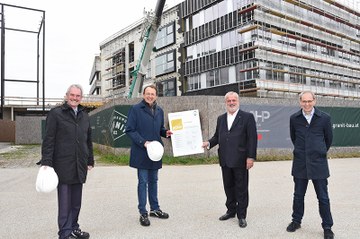Campus St. Pölten Receives Sustainability Award

Gold Certificate from ÖGNI
The Österreichische Gesellschaft für Nachhaltige Immobilienwirtschaft (Austrian association for sustainable building, ÖGNI) assesses real estate projects in terms of sustainability and has now awarded the new Campus St. Pölten the gold certificate for sustainable educational building.
Ever since the beginning of the planning phase for its additional building, the St. Pölten UAS has attached great importance to sustainable building and operation of the new Campus St. Pölten. The gold certificate for sustainable building awarded by the ÖGNI honours the consistent work of the city of St. Pölten as well as the St. Pölten UAS to promote sustainable development.
Key Investment in the Future
“The new building of the St. Pölten University of Applied Sciences is the greatest investment in education our state capital has ever seen and represents another milestone in the educational further development of St. Pölten as a place to study. The construction design of the new Campus St. Pölten is just as sustainable as the attractive educational possibilities. We are proud to say that the efforts made in connection with the new building are already coming to fruition. Obviously, I am very pleased that these efforts have now been honoured by the ÖGNI as well”, says a happy Matthias Stadler, Mayor of St. Pölten.
Together with Karl Wilfing, President of the State Parliament, and St. Pölten UAS Executive Director Gernot Kohl, Mayor Stadler accepted the certificate from ÖGNI Executive Director Peter Engert.
“Investments in the education of our adolescents and young adults are investments in the future of our province. The St. Pölten University of Applied Sciences is an important partner in this endeavour and ensures the continued standing of Lower Austria as a top region in Europe. The ÖGNI certificate proves that the investments in the campus – and the campus itself – are sustainable in two ways: firstly, as a centre of education; secondly, as a building. I would like to congratulate everyone involved on winning the gold certificate and on the perfect conditions awaiting our students”, emphasised Karl Wilfing.
A Building for Generations to Come
The purpose of ÖGNI is to highlight the added value of building certifications in creating buildings that are environmentally friendly and resource-saving, have a high degree of economic and social efficiency, can be used by many generations, and have a positive impact on the users’ health, well-being and performance.
“Real sustainability can be achieved only if all aspects of sustainability – that is, ecology, economy and social functionality – are connected and deemed equal in the building. Our certificate represents an assessment under civil law and is proof of this success”, explains ÖGNI Executive Director Peter Engert.
The Campus as a Participatory Project
St. Pölten UAS Executive Director Gernot Kohl is also pleased with the gold certificate for the new campus: “The Campus St. Pölten is the result of a very participatory planning process that involved intensive input in the form of ideas and requirements from lecturers, staff and students. The sustainability aspect played a central role which is now made visible by the ÖGNI certificate”.
The new campus is supposed to be handed over in September 2021 at the start of the study year 2021/22. “The Campus St. Pölten will feature modern teaching and learning possibilities, flexible usage, and future-oriented workplaces”, explains Kohl. In addition to the St. Pölten UAS, the campus will incorporate the Bertha von Suttner Private University where teaching commenced in spring 2019.
Bidding Consortium Responsible for Construction of New Building
The bidding consortium Caverion consisting of Caverion Österreich GmbH and Bauunternehmung Granit Gesellschaft m.b.H. was awarded the contract for the construction of the new building. The costs for the building, the facility management and the financing amount to just below 55 million euros. The plans for the new university building come from ARGE, consisting of the architectural office NMPB Architekten ZT GmbH and FCP, Fritsch, Chiari & Partner which managed to assert itself against numerous other Austrian and international firms within the framework of an architecture competition.